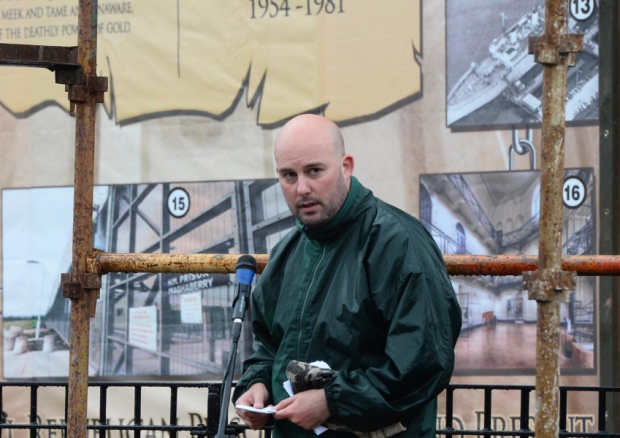
Just after Easter, I wrote about the case of Republican activist and Ardoyne community worker Dee Fennell who was arrested by the Police Service of Northern Ireland on charges of encouraging support for a “proscribed organization,” the New IRA which remains committed to the use of armed force the end British occupation of Northern Ireland.
The charges against Fennell stem from a speech he gave at an Easter Rising commemoration in Lurgan in which he said:
Armed struggle must be a contributory factor to a wider struggle. The use of arms prior to 1916 was legitimate. The use of arms in Easter 1916 was legitimate. The use of arms after 1916 was totally legitimate. In the existing political context of partition, illegal occupation and the denial of national self determination, armed struggle, in 2015, remains a legitimate act of resistance.
As a I noted at the time, Fennell’s words in support of armed struggle as a part of a legitimate campaign to achieve a united Ireland were little different from those uttered by other speakers, including former Provisional IRA members who now serve as representatives of the Crown as officials in Northern Ireland’s power-sharing government. In fact praise for and remembrance of those who have taken up arms in the cause of Irish freedom is part and parcel of virtually all Easter commemorations.
Fennell has now been released on bail, and as the Belfast Telegraph reports this morning, the price of freedom is his silence. As a condition of bail, Fennell is banned from making any public speeches. He is further banned from posting any material online.
From the perspective of an outside observer like me, one of the most surprising features of the Northern Ireland peace process has been the failure of any alternative Republican political parties to emerge to challenge the dominance of Sinn Fein, despite the compromises and abandonments of Republican orthodoxy that have accompanied the party’s transition from a revolutionary movement to a defender of a political status quo in which it is a partner in the very governmental institutions it had once been dedicated to smashing through force of arms.
The case of Dee Fennell helps to explain this. Like Gerry McGeough and Marian Price before him, the British state, with the silence if not complicity of Sinn Fein, has used the legal system to silence those who would speak out forcefully against the existing political status quo. The more effective those speakers, the more credible their voice in the Republican community, and the greater the fear that they might be able to gain support and mount a meaningful challenge to the Republican mainstream, the greater the odds that they will be muzzled.
As Lord John Alderdice, former leader of the Alliance Party, told me in 2011 when I interviewed him for the research I am doing on the maintenance of the peace process:
When you are talking about the capacity of the Republican Movement to police itself, and can you really do it if they can’t shoot them in the knees or whatever, and I would say well, there are other ways. There’s another way, you know, that people are no longer protected, people are more exposed, people won’t get patronage of various kinds, and then the past catches up with you.
Dee Fennell is far from the first, and likely won’t be the last, to learn this lesson.